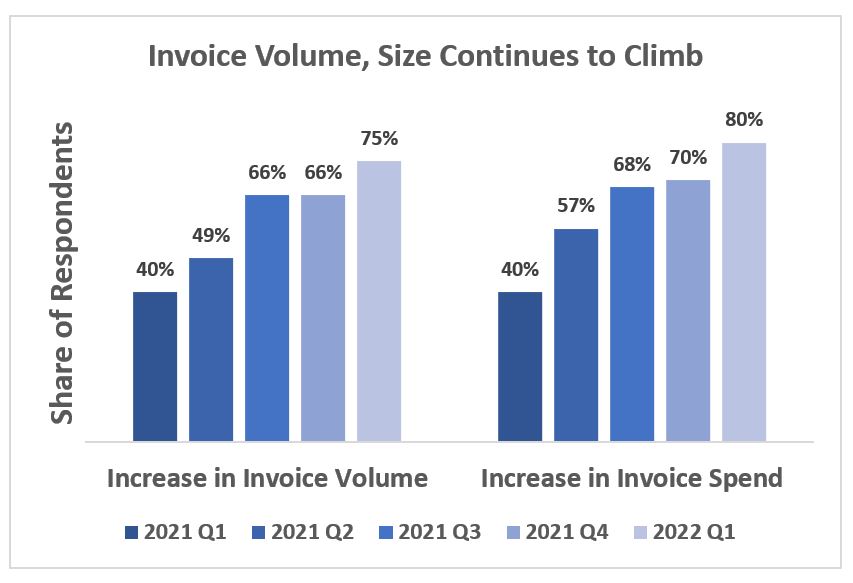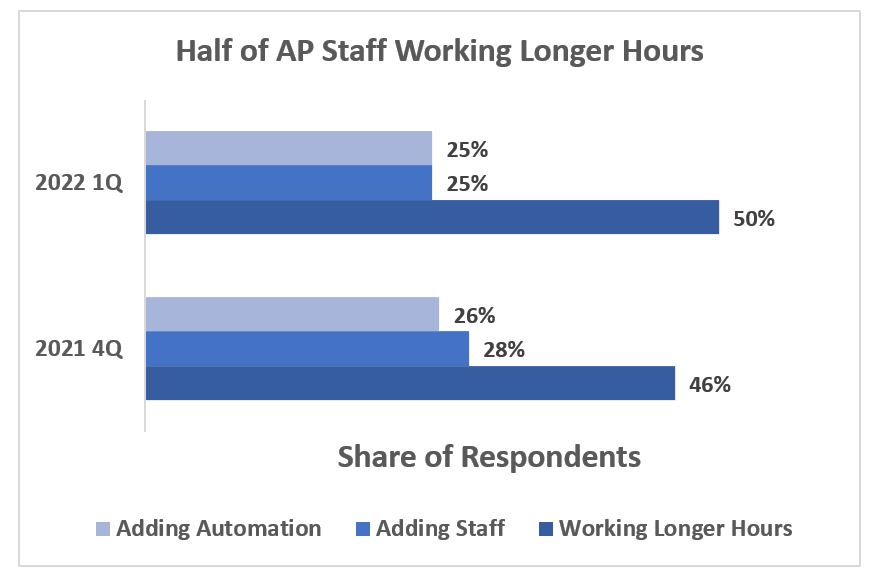
- Membership
- Certification
- Events
- Community
- About
- Help
Most AP staff are working longer hours because invoice volume continues to climb – leading to burnout and a potential rise in resignations. That’s the takeaway of two surveys recently conducted by IOFM.
More than 75% of AP teams report processing more invoices in the most recent quarter, up from 66% in the prior two quarters. Half say they are working longer hours to make up for the additional work; the rest are adding staff or automation to help with the increase in demand.
IOFM reached out to members to ask for their feedback on these trends. We asked questions such as:
Our member responses below illustrate what is occurring in the workplace and what might be done to remedy the trends of burnout, resignations, and retirement.

Exhibit A illustrates the increasing volume of invoices over the past year. Here are our members’ insights about the impact of the increasing workload:
“I am working long hours to try to keep the AP department going at the same pace as when it was fully staffed. I am required to do a lot more with less resources. There is no end in sight. I just keep trudging along, doing all that I can do with no idea about when I will be fully staffed or able to take a vacation. I haven’t had a vacation in two years.”
“I typically have 100 invoices a day to enter — up from last year. I also have extra responsibilities placed on me as well. For example, I have to contact vendors and get proof of delivery for anything that hasn’t been received, which has made me fall behind. Right now, I still have invoices from July 2021 that I am researching. I’m in the middle of a mess and there isn’t anything I can do.”
“I have started feeling increasing pressure doing my AP specialist job due to pandemic and downsizing. We have lost permanent headcount, and our extra hours worked have not been paid. But our workload has increased thanks to business picking up after the first lockdown. As a senior member of AP, I feel like I must fill in, be the back up the during their vacations period, train temporary staff, supervise their inputs to a point, accommodate business requests, and still focus on most difficult tasks that technicians or temps won’t do or do not have the time to do.”
“We are working more hours every day trying to get all caught up with invoices and trying to resolve issues. We hired an additional employee, but this person came only for two months and decided to leave because there was too much work and too many issues with the invoices. That left me and my co-worker trying to get caught up with invoices at the already stressful time when month-end comes.”
Our members speak about what it is like to experience burnout, and how it affects them:
“Burnout is like being a casualty of war. It causes fatigue, lack of sleep (which in turn causes an inability to focus and arrive as my best self for my team). My overall mood and level of happiness has been severely impacted which has taken a toll on my home life with my family and friends. The workplace culture is now one of survival.”
“I have a never-ending to-do list, and I am not able to get caught up. I feel like I’m always scrambling. It doesn’t matter how many hours I work. I just can’t see the light at the end of the tunnel.”
“I am working 65 hours a week for starters. There is just not enough time to get it all done. I never take a break and work through my lunch almost every day. It just tires me out, physically and mentally.”
“I wake up with my tasks in mind, and most of the time, I’m unable to complete those tasks because other urgent matters appear daily. I go to bed with tasks on my mind.”
“I would describe my state as: exhausted, tired, frustrated, beat up, defeated, stressed out, and sometimes paralyzed. With a to-do list as long as my arm, I am often not sure where to start.”
“For me, burnout causes headaches, fatigue, and some depression.”
Initial findings from IOFM’s “Great AP Places to Work” survey found that roughly half of all AP staff report feeling burned out from all the changes in the workplace, including longer hours (See Exhibit B).

“Workplace culture has changed tremendously. No one knew what to expect and no one was prepared for such a pandemic. During much of COVID, everyone was isolated at home and telephone and Zoom were the only way to talk to your team members. You had to learn how to function by yourself without the assistance of co-workers. Additional duties were added on, which resulted in working longer hours at home than at the office. It didn’t help when there were technical difficulties. For example, our VPN kept going down, which created problems using the company servers.”
“Expectations have changed. The organization expects more from us, including volunteering to help areas short on staff and still performing day to day management tasks. There is simply too much work, too many projects going on, and too many hours worked.”
“My organization has become reactive regarding staffing, vs proactive. We need to get more staff in here and trained before we start drowning and getting overwhelmed. AP needs well-trained individuals who want to be in AP. At my company, we often use AP as a pipeline for other teams in Finance. We take the time to train individuals and they become good workers, then we move them to Accounting or other teams. It’s a great opportunity for the individual and the company, but it’s draining AP of qualified staff.”
Among those AP professionals that are burned out, nearly one in four say they are considering leaving their current organization.
This comes at a particularly difficult time because more than one in five AP staff also report they are approaching retirement age in the next five years. In all, nearly half of all AP professionals responding to IOFM surveys say they are at risk of leaving their organization.
"If you asked me to rate myself on a scale of 1-10 for burnout (10 being the worst), I would say I am at a 10. I have been there for a while now (and I have never been even close to this level before this). I have to work, so leaving right now is not an option. I love my job and my employer – it is the situation that is leaving me feeling like this. I previously said that if I won the lotto I would still work – at least until my organization had a suitable replacement. Well, that is a thought of the past! I’d be happily retired tomorrow!”
“From my personal experience of “doing” AP for 28 years. I’m working on my emails all day, answering vendors and employees. I’m constantly entering invoices and solving problems. However, the reason I have started looking to leave my job is the lack of support from upper management. There are some policy/procedure changes that need to be made, and upper management seems to be absent.”
“I’m one of the many AP administrators who is ready to leave my current position. I’ve never had to do all that I am doing in other positions, and I wonder how I can convince my supervisor that these extra jobs should not fall on AP’s plate.”
Despite the many challenges that AP professionals are facing, it is part of AP’s ethic to continuously seek solutions and improvements in their operations. Many see automation to be the key to increased efficiency and less burnout. But it comes with the caveat that implementations must be done carefully — with the proper time and staffing to allow for training and testing.
“At my organization, we are highly automated already, and we continue to find new solutions to improve performance. We have a new ERP system in the works. Our current invoice approval system is being replaced. There are sometimes challenges with automation implementations, however. There is a demand to press forward, even though the system and the team are not ready to go live.”
“We moved to AP Automation in June 2020. We would not have been able to survive the work from home environment without it. It has vastly improved the turnaround time for invoices since we were not allowed to increase staff. It has had a bit of a negative impact though. Now the team spends all day just handling issues and it can cause morale issues.”
“My biggest accomplishment has been to take my operation to 98% paperless. This has helped with the stress of having to keep track of tons of paperwork for filing that was trying to maintain at home. I created an AP SharePoint site to maintain invoice tracking which has been helpful with making sure everything is accounted for and has been posted.”
“We have implemented Concur T&E solutions and automated the expense reporting process for more than 2,000 corporate card holders. We are also embarking upon the implementation of a new ERP system with a fully integrated P2P process.”
“We are just starting AP automation kickoff meeting this month to go live May 30. While it is a lot with an acquisition closing, yearend, and our business ramping up, I am glad to have it to help alleviate some of the AP work.”
Part of the work in alleviating burnout and frustration among AP professionals lies in making changes in the culture. Great strides can be made in simple ways—with better communication from senior management and a show of genuine appreciation for all that AP professionals do, stress our IOFM members.
“I believe that burnout happens due to multiple factors which can include more work with less resources, understaffing, and a lack of relationship-based leadership.”
“We need to hear the words from management that we are doing a great job and that we are important to the company. Right now, there doesn’t seem to be much acknowledgment on a personal level.”
Managers need to be more empathetic and willing to listen. They also need to be more flexible and willing to make accommodations and adjustments. Finally, they need to demonstrate a concern for our health and wellbeing — particularly for those employees that add value and are needed. (And it is time to consider pay raises across the board for our skilled AP professionals.)”
To participate in IOFM’s Great AP Places to Work survey and get early summaries of results – including what you can do to better retain your staff, click here.
To discover how top AP leaders are working to retain their talent, check out this IOFM webinar: What Top Leaders Are Doing to Retain Their Staff.
What are you waiting for?
